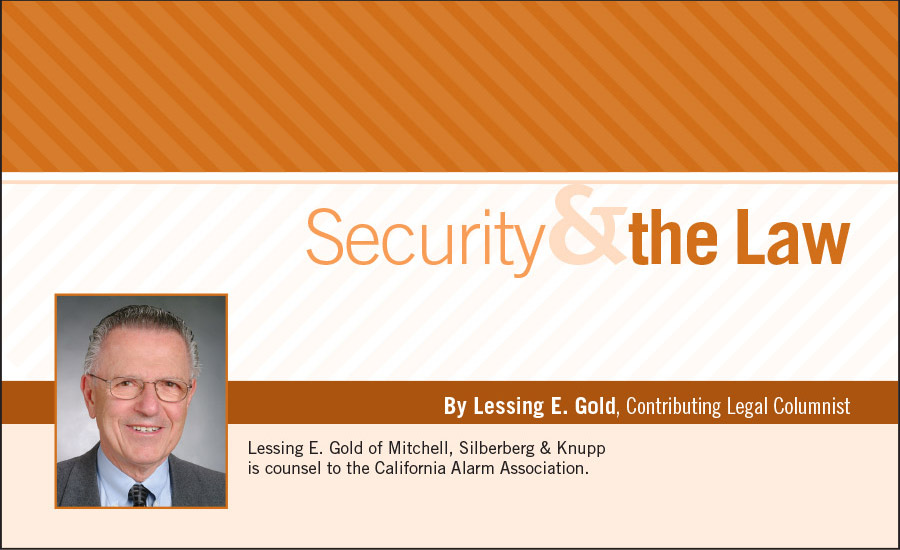An interesting case arose in the State of Florida involving the sale of assets of a security alarm company who was enjoined and prohibited from using certain sales profits. The company that was enjoined sold a number of its customer accounts, rental leases, and other assets from the company subject to the injunction.
The plaintiff originally filed a complaint against the selling alarm company for violations of the Lanham Act, alleging that the alarm company made false statements to the plaintiff’s customers to trick them into signing contracts with a different security alarm company. The lawsuit was settled by agreeing to an injunction, which prohibited the company from making false statements about the plaintiff and from training “any person who may sell for or solicit customer(s) on behalf of the defendant alarm company to violate the terms of the permanent injunction.”
Subsequently, the defendant executed an Asset Purchase Agreement to purchase certain assets of the company under injunction. The agreement never mentioned the injunction.
The enjoined company then terminated its sales force after it executed the agreement, consistent with the clause that prohibited the company from competing with the defendant for five years.
One year later, the plaintiff determined that the defendant who purchased the assets and accounts was violating the terms of the injunction. It moved the District Court for an order to show cause why the defendant should not be held in contempt of the injunction. The plaintiff argued that the injunction bound the defendant because the defendant had purchased part of the alarm business of the party under injunction.
After a hearing, a magistrate judge recommended that the defendant be bound by the injunction. The magistrate judge determined that the defendant and the company under injunction were not in privity, but that the defendant was bound by the injunction as a successor to the company under injunction under a state-law theory of de facto merger.
The Appellate Court, in discussing the appeal pointed out that privity represents a legal conclusion that the relationship between the one who is a party on the record and the non-party is sufficiently close to bind the non-party to the injunction. But, the court pointed out, the concept of privity is ultimately bound by due process. An injunction may not extend to persons who act independently and whose rights have not been adjudged according to law. A court may not bind a party that is not “so identified in interest that those named in the decree that it would be reasonable to conclude that their rights and interests have been represented and adjudicated in the original injunction proceeding.”
The court determined that the defendant and the party under injunction were not in privity because there was insufficient evidence to conclude that the defendant’s interests were so intertwined with the party under injunction that the defendant should be bound by the injunction. The court pointed out that the defendant was a much larger company before acquiring some of the assets of the party under injunction and that the defendant’s sales tactics were clearly established prior to and independent of the relationship between the defendant and the party under injunction.
The court found that there was no evidence that the defendant knew about the injunction before it acquired the assets from or hired employees of the party under injunction. Even if the party under injunction and defendant de facto merged, that the defendant is a successor to a party under injunction under state law does not mean that the defendant is bound by a federal injunction issued against the party under injunction.
Therefore, in the absence of a finding that the defendant knew about the injunction, the District Court erred when it ruled that the defendant was bound by the injunction under the theory of de facto merger. A court cannot bind a party whose “rights have not been adjudged according to law.” Therefore the court vacated the order that the defendant was bound by the injunction.
Readers Ask
Q: One of my very reliable employees has approached me and advised that he requires some extra money and would like to work two shifts. He indicated that I didn’t have to pay him time and a half, but just regular time for the two shifts. I certainly can use him, but under the law would I be required to pay time and a half for the second shift?
To read the answer, go to SDMmag.com. Click the Columns tab and select Security & the Law.
To ask Les Gold a question, e-mail SDM@bnpmedia.com.
ANSWER
I have not checked every state, however, under the law in most states, if he works beyond his 40 hours, you would be required to pay him one and a half times his normal salary for all hours worked in excess of 40 hours per week, notwithstanding the fact that he agreed to work the for straight time. If you don’t pay him time and a half for the hours worked in excess of 40 hours, at some later time he can come in and file a claim and not only will you be responsible for payment of the one and one half times his normal rate, but also penalties for the nonpayment. The fact that he is agreeable to accepting the lesser amount at the time you hire him is immaterial. It will be far less expensive to hire someone else and pay him straight time to do the work.




